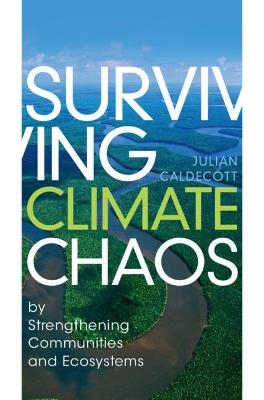
Surviving Climate Chaos
Cambridge University Press (Verlag)
978-1-108-84012-5 (ISBN)
Surviving climate chaos needs communities and ecosystems able to cope with near-random impacts. Their strength depends upon their integrity, so preserving and restoring this is essential. Total climate breakdown might be postponed by extreme efforts to conserve carbon and recapture pollutants, but climate chaos everywhere is now inevitable. Adaptation efforts by Paris Agreement countries are converging on community-based and ecosystem-based strategies, and case studies in Bolivia, Nepal and Tanzania confirm that these are the best ways forward. But success depends on local empowerment through forums, ecosystem tenure security and environmental education. When replicated, networked and shielded by governments, they can strengthen societies against climate chaos while achieving sustainable development. These vital messages are highlighted for all those who seek or have already found a role in promoting adaptation: for students, researchers and teachers, government officials and aid professionals, and for everyone who is now living under threat of climate chaos.
Julian Caldecott is Director of Creatura Ltd, an environmental consultancy, and has a background in wildlife research and conservation in tropical rainforests. Since 2000 he has led evaluations of major aid investments for the EC, Denmark, Norway, Finland, Switzerland, the UK, and the World Bank, focussing on climate change, biodiversity, ecosystem management, sustainability, and institutional and community development. He has written seven books, including Designing Conservation Projects (Cambridge, 1996).
Preface; Acknowledgements; Part I. Context, Tools and Systems: 1. Adaptation and the Paris Agreement; 2. Chaos and Climate Emergency; Part II. Understanding Climate Chaos: 3. Systems, Climate and Ecology; 4. Making Systems Stronger; Part III. Practical System Strengthening: 5. Community Forest User Groups in Nepal; 6. Community Land Titling in Bolivia; 7. Coastal Zone and Community Planning in Zanzibar; 8. Liveable and Sustainable Cities; Part IV. Global Perspectives: 9. Changing Ideas of Adaptation; 10. Learning from the Adaptation Communications; 11. Adaptation in Specific Geographies; Part V. Conclusions: 12. Designing and Evaluating Adaptation Investments; 13. Adaptive Thinking, Feeling and Acting; Abbreviations and Acronyms; References; Index.
| Erscheinungsdatum | 17.09.2021 |
|---|---|
| Zusatzinfo | Worked examples or Exercises |
| Verlagsort | Cambridge |
| Sprache | englisch |
| Maße | 156 x 233 mm |
| Gewicht | 760 g |
| Themenwelt | Naturwissenschaften ► Biologie ► Ökologie / Naturschutz |
| ISBN-10 | 1-108-84012-4 / 1108840124 |
| ISBN-13 | 978-1-108-84012-5 / 9781108840125 |
| Zustand | Neuware |
| Haben Sie eine Frage zum Produkt? |
aus dem Bereich


